
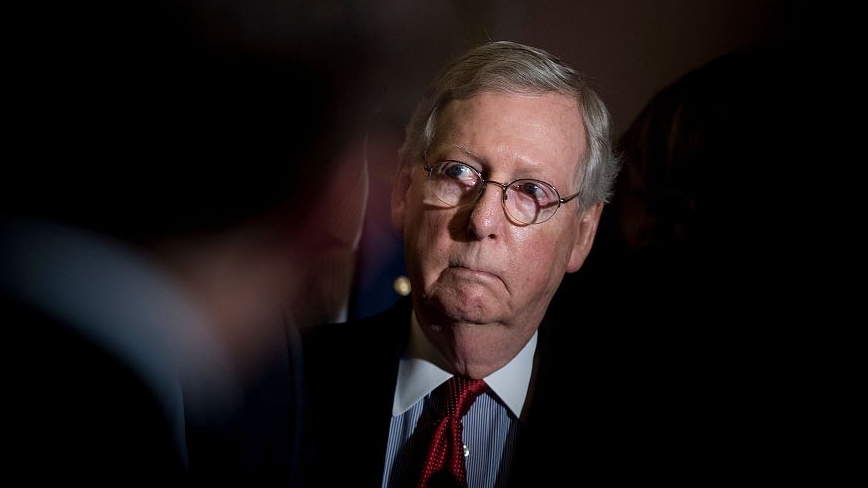
U.S. Senate majority leader Mitch McConnell is rapidly becoming the Democrats' version of Nancy Pelosi – a campaigning bogeyman whose very name fires up the party's base.
McConnell was the most-mentioned Republican at the first Democrat primary debates – more so even than President Donald Trump. Given the 77-year-old senator's reputation as an obstructionist, the moderator asked the White House hopefuls: "Have you got a plan for Mitch McConnell?"
The only cogent answer was to win the Senate, and that's a tall order for the Democrats in 2020.
The top Republican in Congress has been an influential player in the administrations of both Obama and Trump, frustrating the Democrat and facilitating the Republican. Kamala Harris or Pete Buttigieg in office would face a stalemate orchestrated by McConnell too – unless Democrats can flip the chamber in 2020.
So who is the man Democrats love to hate?
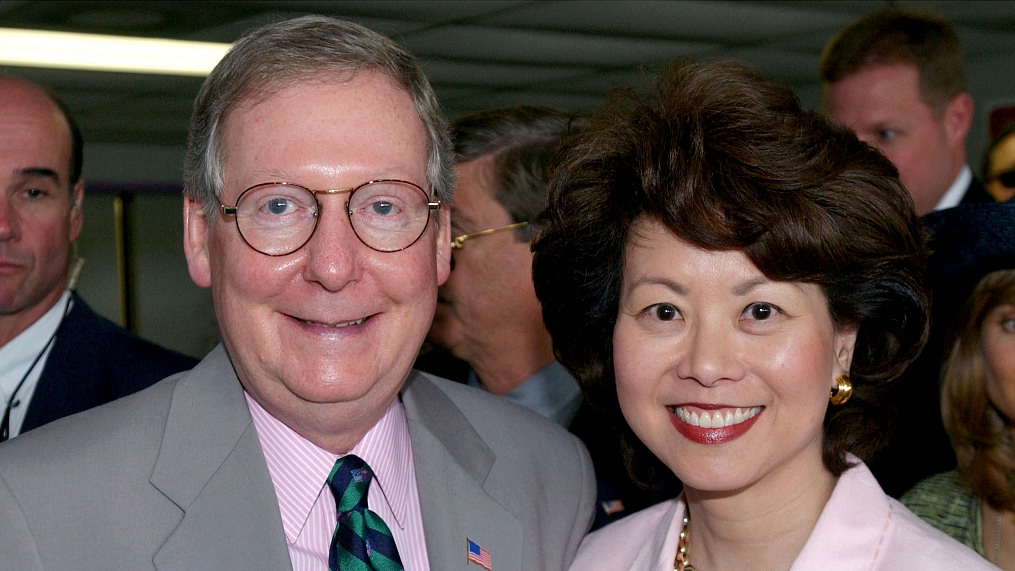
Senator Mitch Mcconnell and then-U.S. Labor Secretary Elaine Chao at the 128th Kentucky Derby, Louisville, Kentucky, May 4, 2002. /VCG Photo
McConnell, born in Alabama in 1942, battled polio as a child and was honorably discharged from the military just five weeks after joining up after being deemed medically unfit to serve.
His first marriage ended in 1980, and he wed Elaine Chao, now U.S. transportation secretary, in 1993. "People remark that I'm in a mixed marriage," Time magazine quoted him as saying. "I don't see it that way. In my first marriage, I married a liberal. Now that was a mixed marriage. With Elaine, she and I understand one another."
McConnell served as deputy assistant attorney general under President Gerald Ford in 1974, and a decade later was elected as Republican senator in Kentucky – a position he has held ever since.
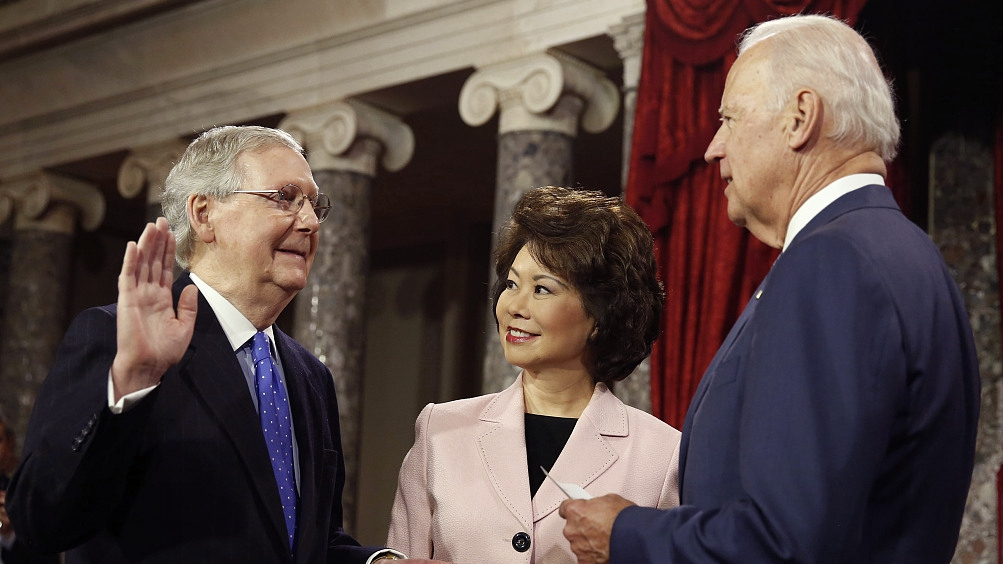
U.S. Senate Majority Leader Mitch McConnell (L) is sworn in to another term as former vice president Joe Biden (R) reads the oath of office and Elaine Chao watches on in the Old Senate Chamber, Washington, January 6, 2015. /VCG Photo
In McConnell's early days in local politics he was regarded as a moderate. He backed abortion rights, was pro-union and even briefly flirted with campaign finance limits, according to biographer Alec MacGillis.
But after his first Senate victory, a narrow win in Kentucky in 1984, he swiftly moved rightwards and embraced a "whatever works" approach to politics.
"The way to understand Mitch McConnell is that for him, what matters most and what has mattered most all along is staying in power and rising on the ladder," MacGillis told NPR. "It's not so much what you do on the way up."
In 2010, McConnell famously said his biggest goal was to ensure Obama was a one-term president. He failed in that aim, but as Senate majority leader since 2015 he has played a central role in thwarting the Democrats and driving the Republican agenda in Congress.
Power Marriage
Now, McConnell is often described as an "enabler" for the Trump presidency.
In temperament and background, the men have little in common. McConnell is rooted in the tradition of the Senate, a poor retail campaigner and taciturn, Trump has little care for convention, but is a natural communicator who loves the spotlight.
“You've got to see the gears turning behind the eyes, because the mouth isn't moving very much,” Paul Ryan, former House speaker, said of McConnell in an interview with the New York Times Magazine.
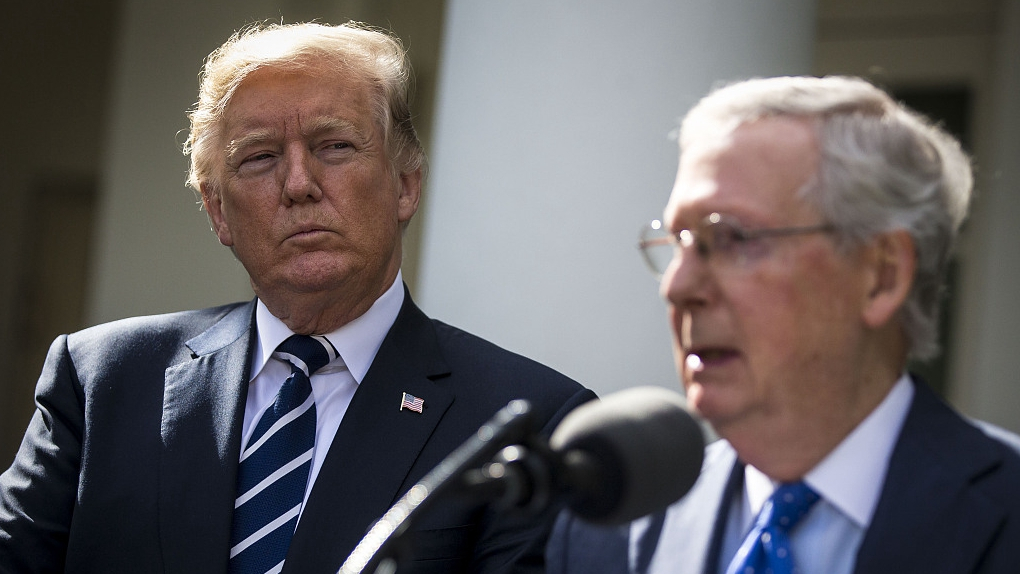
U.S. President Donald Trump (R) listens as Senate Majority Leader Mitch McConnell speaks during a news conference in the Rose Garden of the White House in Washington, October 16, 2017. /VCG Photo
Yet, though McConnell initially supported Rand Paul for the Republican nomination in 2016 and has clashed with Trump, the men have enjoyed a power marriage of convenience, sometimes with Chao holding things together.
"I stand by my man – both of them," Chao quipped in the wake of Trump's criticism of McConnell's handling of health care legislation in 2017. Asked whether the men liked each other in a New York Times interview, she was reportedly silent for a few seconds before replying, "You'll have to ask the president that, and you'll have to ask the leader that."
"I think even though we're pretty different in every way you can think of," McConnell said of Trump in an interview with the same newspaper, "we've had a good sort of team effort here to accomplish as much as we can."
A Court Opening
McConnell's lasting legacy will likely lie in his achievements pulling the strings of judicial appointments, central to the Republican agenda and important to voters, maneuvering in the shadows to pack the courts with conservative judges in a move helpful to Trump electorally and likely to be beneficial to conservative causes long into the future.
Hours after the death of Supreme Court justice Antonin Scalia in February 2016, McConnell issued a statement declaring that "the American people should have a voice in the selection of their next Supreme Court justice." Eleven months followed wherein he refused to allow the Senate to consider an Obama-nominated replacement.
McConnell has described his refusal to countenance the candidacy of Merrick Garland as "the most consequential thing I've ever done," arguing it was his decision to keep a Supreme Court seat open that motivated conservative voters to come out and vote for Trump in 2016.
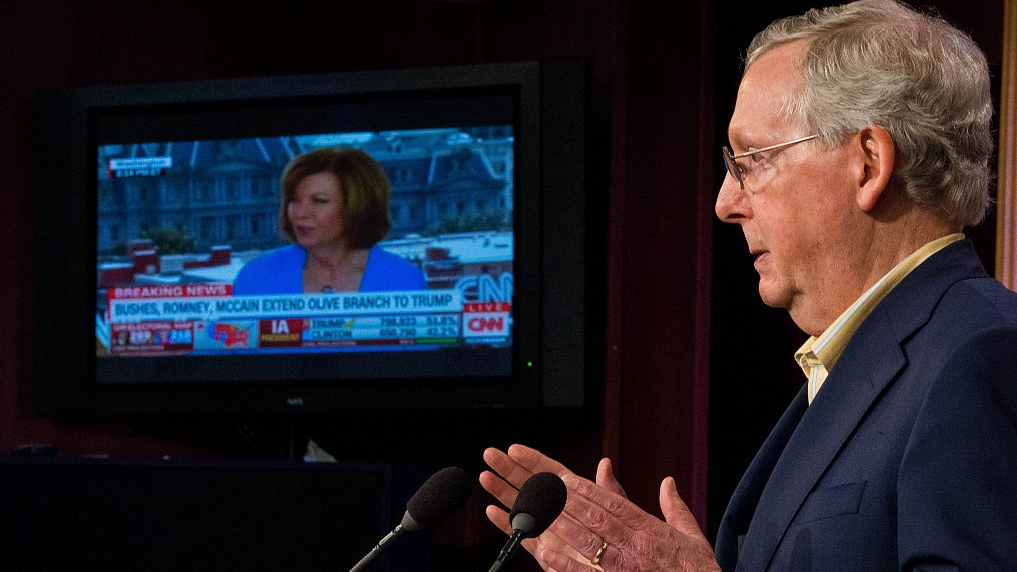
Senate majority leader Mitch McConnell speaks during a press conference following the election of Donald Trump as U.S. president, Capitol Building, Washington D.C., November 9, 2016. /VCG Photo
Neil Gorsuch was duly nominated by Trump and Brett Kavanaugh followed in 2018, ensuring a 5-4 conservative majority on the highest U.S. court.
McConnell has also been instrumental – along with former White House counsel Don McGahn – in placing conservative judges on the benches of lower courts.
He held delayed appointments during the Obama administration and held open around 100 court seats in 2016, while pushing Trump towards working with conservative legal association the Federalist Society to fill them.
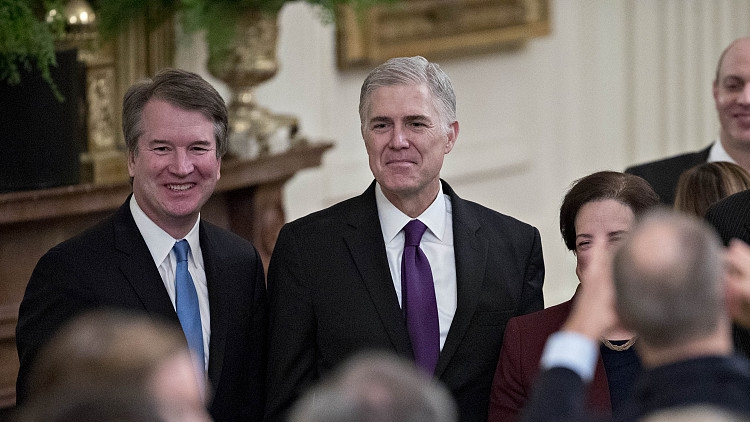
Associate Justices of the Supreme Court Brett Kavanaugh (L) and Neil Gorsuch (R) at the White House in Washington, November 16, 2018. /VCG Photo
McConnell insists the same first-term goals would have been pursued under any Republican president: Appointing conservative judges, scaling back regulation and tax cuts.
He told the New York Times: "If Marco Rubio had been president, we'd have done it. If Jeb Bush had been president, we'd have done it. I say that not to take anything away from President Trump, but he took good advice on all three of those areas that are traditional Republican positions.”
Election 2020
Whether voters will be as supportive of McConnell himself when he bids for a new term in Kentucky in 2020 is another question. For all his success on Capitol Hill, he is not a natural campaigner.
A Morning Consult poll in April showed him to be comfortably the least popular senator in the U.S. Only 36 percent of Kentucky voters approved of his job performance, and just 58 percent of Republicans backed him. Trump had a net positive rating of 15 points in the state in April.
If the Democrats can find a credible challenger McConnell could be in for a close fight, but while the numbers suggest the Senate majority leader is vulnerable he has previously had two big advantages: Money and ruthlessness.
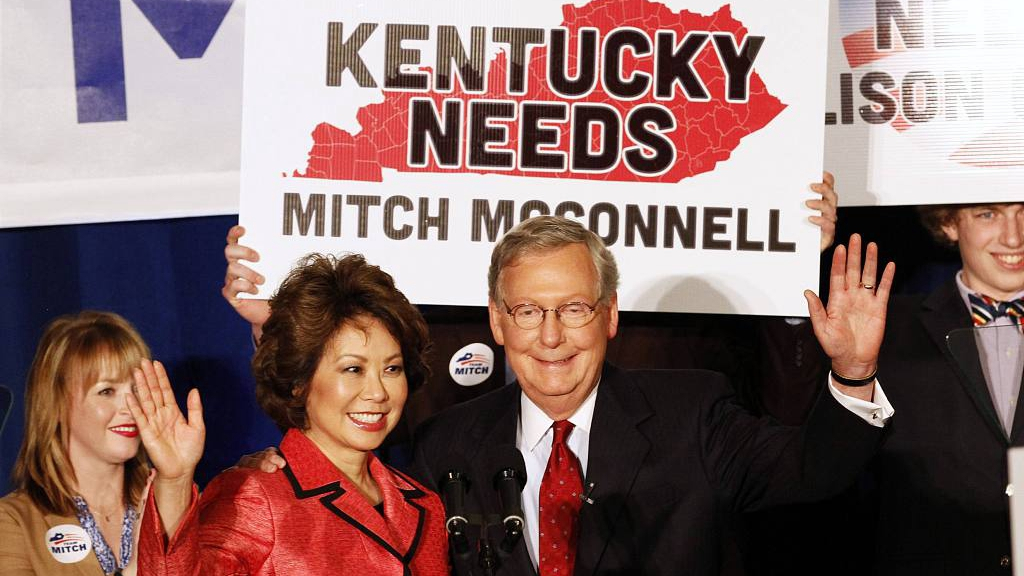
U.S. Senate Republican leader Mitch McConnell and his wife Elaine Chao wave to supporters after defeating challenger Matt Bevin in the Republican primary elections in Louisville, Kentucky, May 20, 2014. /VCG Photo
Conservative groups, critical of his handling of Obamacare, tried to primary McConnell in 2014 – there is no expectation of a repeat in 2020, given his union with Trump – but the challenge from Matt Bevin was dealt with mercilessly by McConnell.
"McConnell made it so nasty when Matt ran against him and he spent so much money, I think it intimidated people who might want to run," Scott Hofstra, a spokesman for the United Kentucky Tea Party, told McClatchy.
Part of the reason for that wealth is McConnell's marriage into the Chao family. Filings show the couple received a gift of 5-25 million U.S. dollars in 2008, and the Chao family has donated to McConnell and the Kentucky Republican party.
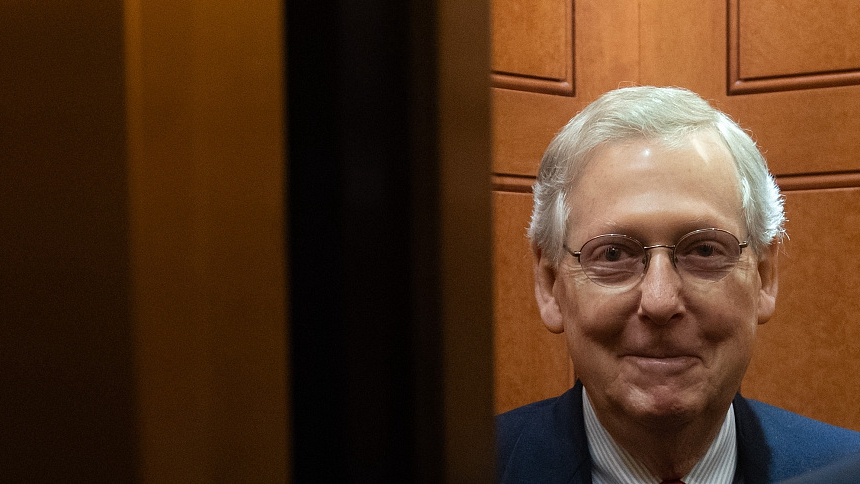
U.S. Senate Majority Leader Mitch McConnell stands in an elevator at the US Capitol in Washington, December 21, 2018. /VCG Photo
Whatever happens in 2020 – and given McConnell's record, the odds are on him surviving – McConnell's role in making the conservative judicial appointments is likely to be felt across the U.S. for decades to come.
McConnell's long-game and pragmatic, some would say cynical, approach to politics has achieved results, and only an election defeat for himself or his party in 2020 can curb his opportunism.
What would happen, McConnell was asked at an event in Kentucky in May, if Trump gets an opportunity to appoint a justice to the Supreme Court in 2020, pre-election, just as Obama was prevented from doing in 2016?
"Oh, we'd fill it!"

Copyright © 2018 CGTN. Beijing ICP prepared NO.16065310-3
Copyright © 2018 CGTN. Beijing ICP prepared NO.16065310-3